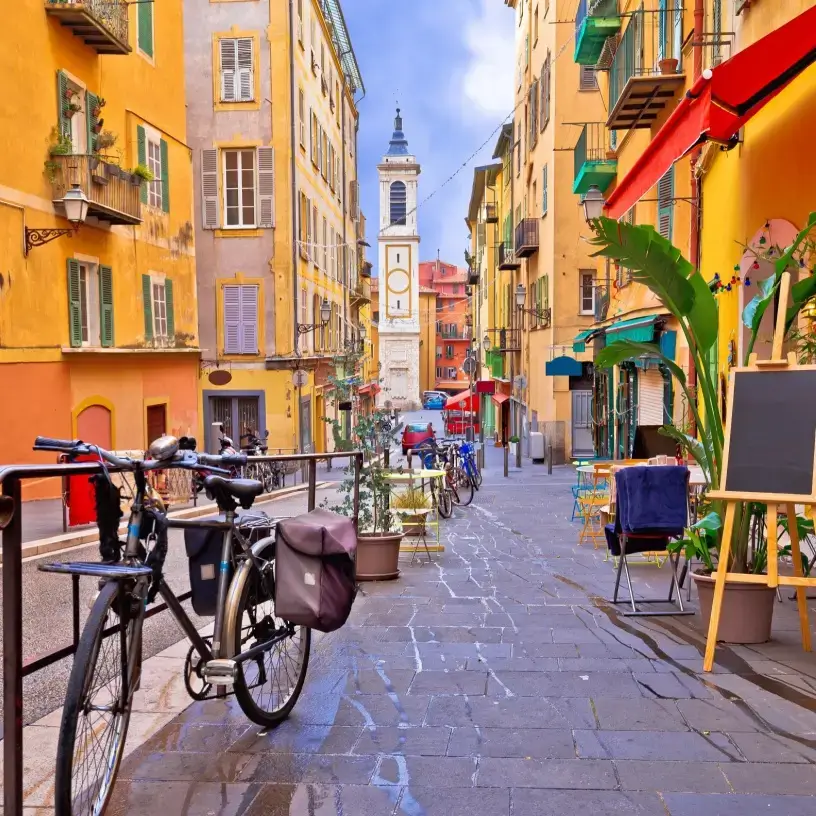Home / Compare Travel Insurance / Travel insurance for Fra…

Key takeaways
Whether you’re travelling to popular destinations like Paris, Lyon, Nice or anywhere in between, here’s why taking out a travel insurance policy for France may be a wise move.
- A travel insurance policy can help financially protect you and give you peace of mind in case of a range of unforeseen events.
- Pick pocketing and theft are common in France, particularly in places like Paris, but the right travel insurance plan may reimburse you for your losses.
- Choosing a higher policy excess can lower the cost of your premium, but make sure you can afford to pay the excess amount you choose.
- Cover will vary between insurers, levels of cover and add-ons, so consider what benefits you’re looking for.
Why take out travel insurance for France?
No matter which part of France you’re travelling to, it’s always a good idea to consider travel insurance as your policy may provide a financial safety net if your trip goes awry. Not sure how travel insurance for France helps? Here’s a few examples:
- Medical cover. Even a basic travel insurance policy may cover some of your medical expenses since you won’t be covered by Medicare or private health insurance if you have a medical emergency while on holiday.
- Adventure cover. If you plan to take on any adventurous activities, you may need extra cover. This may help protect you from unexpected costs, such as if you can’t use your ski pass due to bad weather or are injured on a hike.
- Cancellation cover. If an unforeseen event means you need to cancel some or all of your trip, you may be covered for some of the costs of pre-booked accommodation, tours and more.
Choosing the right travel insurance for France
It’s not just getting a travel insurance policy that’s important – it’s getting the right policy for you. Choosing your cover comes down to a few key steps:
- Assessing your needs for your vacation in France, and thinking about the type of cover you need, and if you want to purchase any optional extras.
- Determining the value of what you’re taking with you, like your belongings, how much cash you’re carrying, etc.
- Having a good idea of your health status, current medical conditions and potential health care needs while you visit France.
These considerations will help you determine what level of cover you’ll require (basic, mid-range or comprehensive cover) and what exactly you want covered in your policy.
Expert tips for choosing the right travel insurance for France
Our Executive General Manager for General Insurance, Adrian Taylor, has some top tips for helping you choose a suitable travel insurance policy.

Check if you’re covered for COVID-19
Many insurers may provide cover for certain COVID-19 (coronavirus) related losses; however, in most cases, you’ll need to purchase their comprehensive policy for COVID-19 coverage to be included. Look for the COVID-19 icon when you compare products on our website.
Consider extra cover if you plan to drive
If you’re planning to rent a car, consider getting rental vehicle excess cover. This covers your excess payment to the rental company if your vehicle is damaged or stolen. For two-wheeled vehicles, consider motorcycle and scooter cover.
Declare any pre-existing medical conditions
Always declare any pre-existing medical conditions as part of your travel insurance application to ensure you have the cover you need. This can also help prevent any unpleasant surprises if you are injured or become ill while travelling and need to claim.
The basics of travel insurance for France
Do I need travel insurance for France?
The real question is whether you can afford not to have travel insurance. Mishaps, injuries and accidents can happen anytime and anywhere, and travel insurance is designed to help financially protect you against these unexpected occurrences. It’s vital to get travel insurance when going aboard, whether to France, Europe or any other overseas destination.
An important consideration is that France, while having a good healthcare system, does not have a Reciprocal Health Care Agreement with Australia. As a result, receiving necessary medical treatment in the event of an injury or illness can see you pay thousands out of pocket if you don’t have the right cover in place.
Check out the Product Disclosure Statement (PDS) to see what’s included in your travel insurance policy, and the Target Market Determination to understand if your eligible for the policy.
What should my travel insurance policy for France include?
You may have a few different levels of travel cover to choose from. The level of cover that is best for you will depend on your specific circumstances and needs.
No matter what policy best suits your needs, a comprehensive travel insurance policy often provides benefits for:
- Overseas hospital and medical costs
- Trip cancellation, amendment and delay costs
- Lost, damaged or stolen luggage and personal belongings
- Personal liability
- Permanent disability and loss of income
- Accidental death, repatriation and medical evacuation
- 24-7 emergency assistance
- Some sports and activities.
If you plan on visiting the French Alps, be aware that skiing and snowboarding aren’t covered under a regular policy. For on-piste cover, you’ll need to purchase a snow sports optional extra to add to your policy.
Carefully read your policy’s PDS for limits of cover, policy terms, conditions and exclusions.
What is excluded from travel insurance for France?
Travel insurance often has exclusions you should be aware of before purchasing any policy. These can differ between policies and providers, but generally, travel insurance doesn’t cover:
- Travelling to countries or regions that have government-issued travel warnings (these are listed on Smartraveller)
- Negligence leading to loss or damage of personal belongings and valuables (e.g. forgetting your luggage outside your hotel)
- Trip cancellations due to changing your mind or being unprepared (e.g. forgetting to renew your passport)
- Extreme or high-risk adventure sports and activities, such as skiing or snowboarding (you may be able to cover these activities by purchasing additional specialised cover)
- Hire car excess if the accident was caused by intentionally not adhering to road rules or if the driver was under the influence of alcohol or drugs
- Claims for incidents where you were intoxicated from taking drugs or alcohol
- Claims resulting from incidents where you acted illegally, recklessly or dangerously
- Claims resulting from incidents of war, terrorism or civil unrest
- Loss or injuries from pre-existing conditions that weren’t disclosed to your insurer or that were excluded from coverage
What are things to be aware of in France?
Terrorism and civil unrest
As a result of previous terrorist attacks, French authorities are on high alert for any suspicious activities, so you’re likely to encounter tight security around public places and at border points. It’s important to note that acts of terrorism are generally excluded from travel insurance cover.
France also has a history of protests and violent demonstrations. Your insurer won’t cover costs relating to these incidents, so avoid protests whenever possible and check local media to stay up to date with ongoing issues. We recommend you check the Smartraveller website before you travel to France to ensure no active travel warnings are in place.
Scams and thieves
Tourists getting hoodwinked is, unfortunately, a practise as old as time, which means you must be cautious when you’re visiting popular French cities (e.g. Paris, Marseilles, Bordeaux). As you can imagine, popular tourist attractions and high-traffic public transport provide the perfect hunting grounds for petty criminals who are known to snatch bags and pickpocket people.
Be sure to keep your money and your passport separated from one another and don’t carry all your cash and credit cards in one place. Potential thieves tend to thrive in crowded tourist spaces, so even when you’re captivated by the Eiffel Tower and admiring famous artwork in the Louvre, remember to maintain vigilance over your possessions.
Cycling and driving
Are you planning to hit the road in France? You’ll need a valid Australian driver’s licence and International Driving Permit (IDP).
If you’re considering cycling or driving a scooter around instead, consider adding motorbike and scooter cover to your policy. Without this add-on, you might not be covered for medical costs if you get into an accident. Your travel insurance may also deny any claims if you disregard safety standards, like riding without a helmet, for example.
Passport and visa requirements
If you’re travelling to France as an Australian citizen, you should make sure your passport is valid for at least six months after the period of your intended stay.
Australians don’t need a visa to enter France for visits of up to 90 days (unless travelling for reasons other than tourism). This is because Australia has a bilateral visa waiver agreement with France and the other Schengen countries.1 The Schengen area consists of 27 European countries, allowing visitors to travel through these countries without requiring a visa for each one or going through border controls.
Meet our travel insurance expert, Adrian Taylor
As a General Insurance expert with over 13 years’ experience in financial services, Adrian Taylor believes in educating customers about the importance of travel insurance so that anyone can kick back and make the most of their time away from home. While no one wants a disrupted holiday, a suitable travel insurance policy can provide a financial safety net for yourself, your belongings and your trip in case things go wrong.
1 Smartraveller. Australian Government Department of Foreign Affairs and Trade. Visa and entry requirements in Europe and the Schengen Area. Last updated Oct 2023. Accessed Dec 2023.


